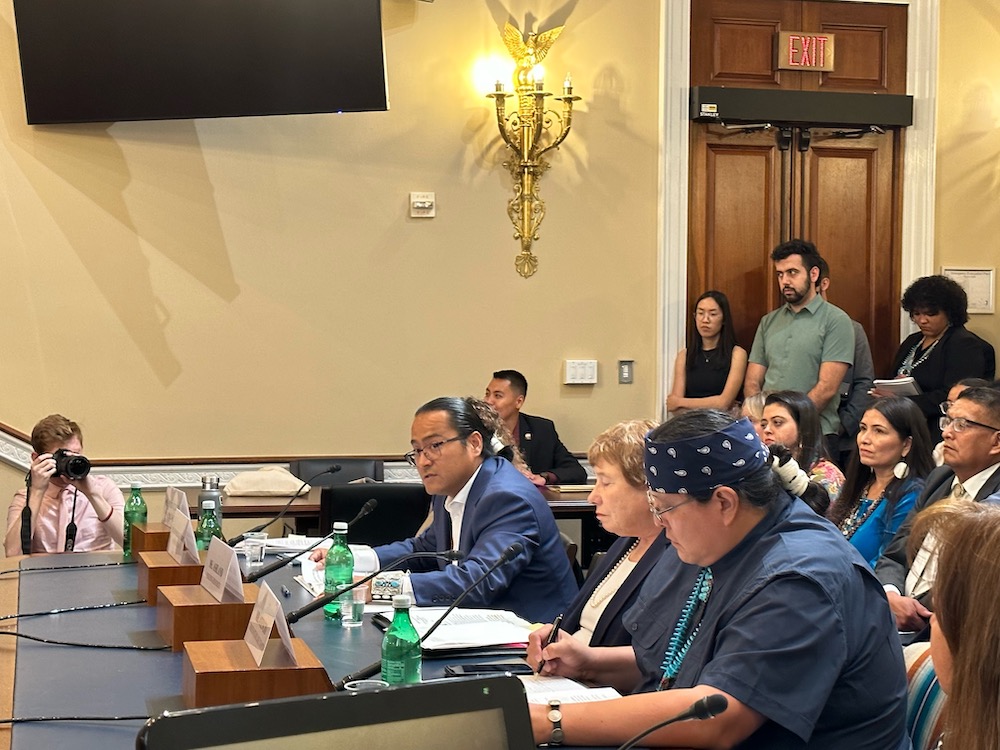
- Details
- By Darren Thompson
Navajo Nation citizens expressed disappointment with Interior Secretary Deb Haaland (Laguna Pueblo) and the Bureau of Land Management for stripping away their mineral rights at a Congressional subcommittee hearing on Wednesday. The July 12 hearing focused on a bill that would reverse protections around Chaco Culture National Historical Park (CCNHP) in New Mexico and restore Navajo mineral rights in the area.
The hearing was held by the Committee on Natural Resources Subcommittee on Energy and Mineral Resources.
At stake are Navajo Nation’s mineral rights to land surrounding the National Park, which many citizens use to support themselves and their families.
Navajo Nation President Dr. Buu Nygren, who spoke in favor of the bill, said at Thursday’s Congressional hearing that the allottees, who represent less than 1% of the Navajo Nation citizenship, felt their concerns were not heard or considered. “The allottees felt like they were hit with a trash can,” Nygren said.
If the bill passes, it will nullify the Bureau of Land Management’s (BLM) Public Land Order (PLO) issued last month that bans all new oil, gas, and mineral extraction within ten additional miles around the CCNHP.
The park is home to cultural sites that are the sacred ancestral homelands by the Hopi and Pueblo people.
In June 2023, the Biden administration issued Public Land Order 7923, withdrawing approximately 337,000 acres of the federal mineral estate surrounding the CCNHP for a period of 20 years.
The order was celebrated by many Pueblo communities and leaders, along with dozens of conservation organizations throughout the country; however, the Navajo Nation contends that the withdrawal of the lands would deny Navajo Nation allottees access to their mineral rights.
The allotments are located in the San Juan Basin in New Mexico, which has valuable oil and gas reserves.
According to the House Committee on Natural Resources, there are currently 53 individual Indian allotments leased within the 10-mile buffer zone around the CCNHP. The leases provide an average of $6.2 million a year in royalties for 5,462 allottees, about $1,135 a year per allottee.
“Our right to our modest income, from oil and gas payments, were stripped away by Public Land Order 7923, the Chaco 10-mile buffer withdrawal,” said Delora Hesuse, a Navajo tribal citizen and allottee from the Navajo Nation’s Nageezi Chapter in New Mexico, who voiced her support of the bill at Thursday’s legislative hearing. “This was done despite strong and consistent opposition of the allottees and our tribe, the Navajo Nation.
Hesuse also spoke to the House Committee on Natural Resources on a previous bill, the Chaco Cultural Heritage Area Protection Act of 2019, which aimed to create a protected 10-mile buffer zone around the CCNHP. Then, she stated the 10-mile buffer zone would put a stop to many Navajo families’ only source of income.
At Thursday’s hearing, Hesuse expressed disappointment in the current administration.
“When Secretary Haaland came into office, she promised to listen to Indian Country and give us a stronger role in decisions affecting our lives, but she did not listen,” Hesuse said. “She did not listen to our allottee voices, she did not consult with us or with the Navajo Nation on our proposed five-mile compromise.”
In early 2020, the Navajo Nation — with the support of its allottees — passed a resolution opposing the Chaco Cultural Heritage Area Protection Act and proposed a 5-mile buffer zone around the area instead of the 10-mile buffer zone. In 2021, Navajo Nation citizens met with members of Congress to discuss the compromise.
At a budget hearing with the House Committee on Natural Resources in April 2023, Haaland was asked by Rep. Paul Gosar (R-AZ) if she knew how much revenue Navajo allottees would lose due to the proposed order that would protect an additional 10 miles from extraction around the CCNHP.
Haaland replied that she did not know the impact the decision would have on the Navajo allottees. She also did not commit to considering those impacts before issuing the public land order on June 2.
Known as the Energy Opportunities for All Act (H.R. 4374), the bill was introduced to the House of Representatives on June 27 by Representative Eli Crane (R-AZ) with Representative Paul Gosar (R-AZ), who then sent it to the Subcommittee for a legislative hearing.
There is no companion bill in the Senate.
More Stories Like This
NCAI Passes Two Emergency Resolutions on Immigration Enforcement ActivitiesChickasaw Lighthorse Police Officer named Indian Country Law Enforcement Officer of the Year
Indian Gaming Association Rallies Broad Coalition Against Sports Event Contracts It Calls Illegal Threat to Tribal Sovereignty
Navajo Resources and Development Committee Issues Notice on Livestock Inspection Requirements
American Prairie, Tribal Coalition Files Protest Over Rescinded Grazing Rights
Help us defend tribal sovereignty.
At Native News Online, our mission is rooted in telling the stories that strengthen sovereignty and uplift Indigenous voices — not just at year’s end, but every single day.
Because of your generosity last year, we were able to keep our reporters on the ground in tribal communities, at national gatherings and in the halls of Congress — covering the issues that matter most to Indian Country: sovereignty, culture, education, health and economic opportunity.
That support sustained us through a tough year in 2025. Now, as we look to the year ahead, we need your help right now to ensure warrior journalism remains strong — reporting that defends tribal sovereignty, amplifies Native truth, and holds power accountable.
 The stakes couldn't be higher. Your support keeps Native voices heard, Native stories told and Native sovereignty defended.
The stakes couldn't be higher. Your support keeps Native voices heard, Native stories told and Native sovereignty defended.
Stand with Warrior Journalism today.
Levi Rickert (Potawatomi), Editor & Publisher
